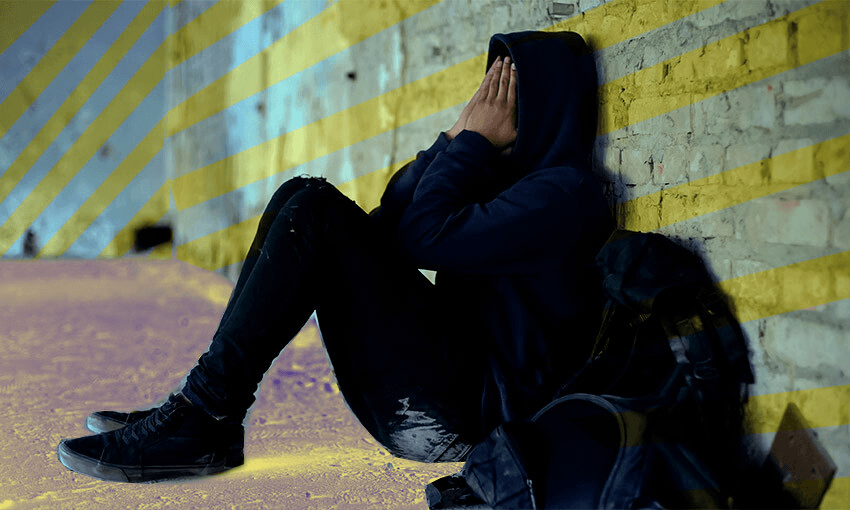Teenagers as young as 14 have been needing emergency housing during lockdown, and social agencies say it’s a growing issue requiring urgent attention.
It’s midnight in the middle of lockdown and another call has come through that a young person needs a place to stay.
At Lifewise in Auckland, a team member will assess the situation and decide whether the young person needs to be immediately housed at the organisation’s transitional accommodation facility.
Jamie Akarana, one of Lifewise’s youth development workers, says the new arrivals, aged between 14 and 19, tend to turn up with no phone or change of clothes, and are often escaping abusive or risky living circumstances.
“It’s a bit of an eye-opener seeing the things that go on for these young people,” she says. “They aren’t choosing to be homeless, but if the other option is to be abused, then they are choosing not to be in that environment.
“Obviously lockdown is hard for everyone but for these young people, they are in a limbo, with not a lot of hope, and right now everything seems like an emergency.”
Of those not fleeing abusive situations, some have just “exited out of [state] care and are floating about and are lost in between”. She describes one situation where a young woman’s foster care placement ended just before lockdown. Now she can’t get back to her hometown because of the border closure.
“She can’t get back home and the people who can pick her up aren’t able to get an exemption to get her.” There are no flights and no buses “so she’s just trapped here, needing emergency housing, until someone can collect her or we drop down a level”.
The housing facility, a former backpackers in Auckland’s CBD, is a temporary measure funded just for lockdown. But what happens to these young people when the city moves to level two?
“The government has really helped a lot during this lockdown by providing this space,” Akarana says. “But there’s a lot of uncertainty about where they will go after this is finished.”
Lifewise community services manager Peter Shimwell says over 65% of the people his organisation has helped during lockdown have been 16 to 19-year-olds..
“At any one time we’re working with 60-70 young people,” Shimwell says, noting these numbers have been growing over the last few years. Given many chronic rough sleepers began their life on the streets as teenagers, he’s increasingly worried “we could lose another generation to homelessness”.
Shimwell’s hoping the government will create a plan to address this, as ”staying in emergency housing indefinitely is not a strategy, it is a holding pattern”.
“We need a proper strategy so young people who exit care and youth correctional facilities aren’t left with nowhere to go. We need to build the capacity as a sector and not just for their housing needs, but also their mental health, training and support needs.”
Lifewise is part of the Manaaki Rangatahi ki Tamaki youth homelessness collective, alongside VOYCE Whakaronga Mai, Auckland City Mission, Lifewise, Strive Community Trust, RainbowYOUTH and Vision West.
This Sunday is World Homeless Day and the collective is encouraging people to mark the day by signing a petition calling for more government action on youth homelessness.
Auckland councillor Fa’anana Efeso Collins holds the council’s homelessness portfolio and backs Manaaki Rangatahi ki Tamaki’s call “to develop a national strategy addressing youth homelessness as a guide to doing this right”.
“We can’t allow our young people to experience more barriers and hardship because of this lockdown, so it’s on all of us to come up with better solutions to provide safe and adequate housing for them.”
The Ministry for Children has the primary responsibility for young people who have been in state care or youth justice residences. Deputy chief executive Kiri Milne told The Spinoff the ministry provides a range of services to ensure they “acquire the knowledge, skills, resources and supports they need to thrive”.
“Advice and assistance can come from the dedicated transition helpline team at our national call centre, a transition worker, a site office or a youth justice facility or residence. [And] from the age of 15, social workers’ conversations with rangatahi will naturally include discussions about their transition from care or from a youth justice residential placement.”
The Ministry for Housing and Urban Development (HUD) oversees the emergency housing sector that supports those who are homeless. The ministry’s deputy chief executive for housing supply, response and partnerships is Anne Shaw. In a written response, she told The Spinoff HUD is “increasing transitional housing places for young people” as part of the Aotearoa New Zealand Homelessness Action Plan.
Shaw said Covid has also meant HUD has “brought forward longer-term work” by providing more housing immediately for young people, adding that “more places are coming on board”.
“In addition to the support offered by MSD’s Youth Service, HUD currently funds a number of providers to deliver transitional and supported housing places for rangatahi across Aotearoa New Zealand. These services are designed to reflect the specific needs of the young people they support and the intensity of services that may be required.”
A HUD spokesperson confirmed Lifewise was a temporary solution which will continue to be funded while it’s “bringing on more transitional housing for rangatahi in Auckland”.
With Auckland City Mission this week being named as a location of interest, its chief executive Helen Robinson says the ongoing spread of delta highlights the importance of having more permanent housing solutions to keep people, particularly youth, off the streets.
“It’s a pretty dynamic environment at the moment,” she says. “While it’s the first time in the last 18 months to have a positive test here, what we’re hearing from our outreach workers is the longer Auckland is in lockdown, the more difficult it is.
“And if life wasn’t good at the best of times, then Covid just exacerbates it.”



